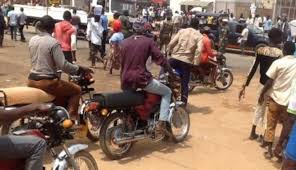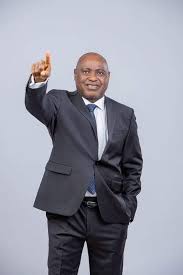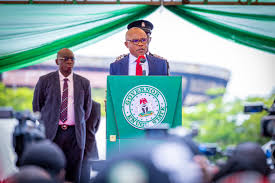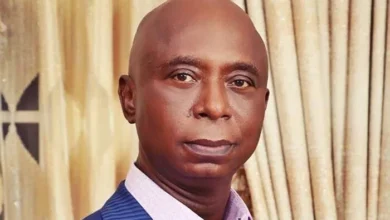Ibrahim Traore is transforming Burkina Faso, says Dr Rachel Leslie

Dr Leslie is a scholar dedicated to preserving and promoting African history and culture, talks about how she was inspired by Pan-African scholars who were her father’s contemporaries in France where she was born. On Channels Television’s Amazing Africans programme, she speaks about poor leadership in Africa and how Captain Ibrahim Traoré of Burkina Faso has distinguished himself from others.
Question: You got your education in the US, in Germany, and in Nigeria. Talk to us about that experience of having to travel all around the world.
Answer: I am a pan-African human being as well as a Pan-African scholar because, as you said, I was born in Paris at a time when black intelligentsia were gathered in Paris. My father was the first man of African descent to do his PhD in Mathematics at the University of Paris. He was there in Paris at a time when Cheikh Anta Diop was there with his friends: Richard Wright and Langston Hughes. I refer to that era of French history as Paris Noir, Black Paris. There were a lot of black intellectuals, a lot of black artists there at the time. I was born there.
I was born into this sort of ambiance of Pan-Africanism, of activism and then after that, my parents met here on the campus of the University of Ibadan.
My father later became a Professor of Mathematics at the University of Ibadan at a time when the recently late Professor Olunloyo or Governor Olunloyo as many know him was also teaching in the Mathematics Department.
And then my mother was a student at the University of Ibadan. I spent a bit of my childhood at University of California Berkeley until my father was tenured at Northwestern University and then I went to Northwestern University. I grew up on that campus, I grew up on Northwestern University campus in Illinois. I was elected to be president of the Black Student Council while I was there and I was young and much more of an activist than I am now.
Question: Talking about Africa and the question of leadership, we see that Ibrahim Traoré has grabbed the headlines in very recent times. So, when you look at someone like him and you look at the continent and the quest for true or effective leadership, I wonder perhaps what your thoughts are.
Answer: Rather than to characterise ourselves by victimhood, let’s say have we learned from the past? I don’t think that we yet have, but there are some who have, and I think that Ibrahim Traoré is an example of an African who’s learned from the past, who’s learned from the distant past, the recent past. I would say that he is a child of Pan-Africanist revolutionary, Thomas Sankara.
Question: What does that mean?
Answer: Sankara was an African young military man like Ibrahim Traoré who was also very African-centred, very Pan-African in his thinking. So, Ibrahim is very much like his forefather Sankara, like Julius Nyerere, like Nelson Mandela, like Léopold Sédar Senghor, and like Patrice Lumumba. So, Ibrahim Traoré is very much coming out of this decolonial tradition in Africa of Negritude and Pan-Africanism, the early Kwame Nkrumah, I would add to that group, and so I think Ibrahim Traoré is coming out of that tradition of African leadership. I think that he’s doing amazing things in terms of trying to repurpose the resources of his country for development, for human development and also industrial development and infrastructure and all of those things that he’s doing.
He has to be careful to find a balance between the militaristic nationalisation of the resources of the region for the benefit of Africans and preserving a discursive intellectual space in the society and in civil society that military culture doesn’t end up dominating the society. The African Historical Society is a non-political institution. We try not to take sides in political movements. We cooperate with incumbent governments all over Africa. That’s what I would say about Ibrahim Traoré. I think he’s not a new phenomenon, it’s perhaps novel in this period. I think Muammar Gaddafi was trying to do a lot of the similar sorts of things that Ibrahim Traoré is doing.
Question: So, are you afraid for his life as well?
Answer: Absolutely! I think that his life is in danger. I don’t know any head of state that doesn’t have the most professional security in the world. That’s part of the nature of being a head of state. But in his case, because he’s upsetting global economic structures and global economic interests, he needs to be very, very careful.
Question: So, when you look at him and look at Nigeria, with all of the potential and natural resources, is that the kind of transformation you like to see here in Nigeria?
Answer: I think that Nigeria does not require a military junta to be able to transform itself, because of the staggering wealth of Nigeria. I think Nigeria is maybe richer than the Congo. I don’t think there’s a natural resource that’s not found in Nigeria, and then Nigeria has what the what the World Bank problematically calls human capital. It has a population of 200 million. There’s oil, there’s natural gas, there’s uranium, there’s titanium, there’s diamonds, there’s gold, there’s this incredibly lush and fertile land, there’s sunlight, there’s rain, and there’s water.
Nigeria is incredibly wealthy. Nigeria also exports skilled labour and educated people. So, I think that Nigeria playing a leadership role in Africa is long overdue. I think that Nigeria can easily surpass what Ibrahim is doing.





